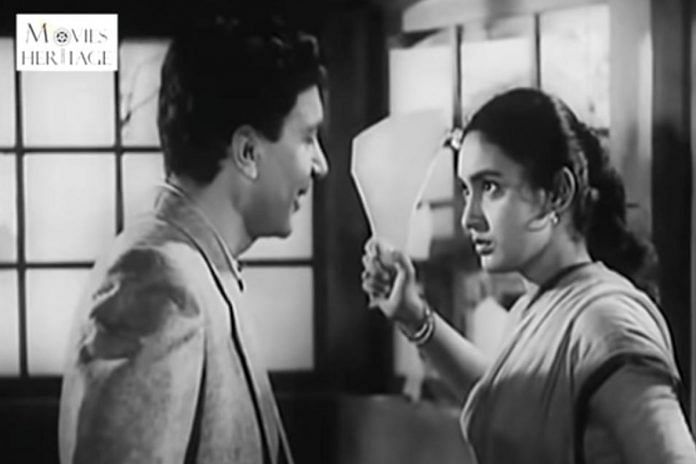One of the most poignant moments in the 1955 film Seema occurs when Nutan’s character first encounters Balraj Sahni’s. Frustrated and hurt, Nutan aches to break free from her unfortunate circumstances by running away from a women’s reform facility Sahni is in charge of. “I, too, would love to escape to the sea or climb the highest mountains, but we cannot run away from this world full of despair and shattered dreams,” says Sahni in a response that is as profound as it is bittersweet. This exchange perfectly captures the film’s central theme; a woman wronged by society meets an eternal optimist who reminds her that joy and sorrow are two sides of the same coin. The contrast between the two characters’ voices in that scene underscores this message, emphasising the importance of finding kindness in the bleakest circumstances.
Directed by Amiya Chakravarty, Seema is a thoughtful exploration of the human spirit’s ability to transcend adversity and overcome self-imposed limitations in the face of injustice. For some of us in the younger generation, the film’s timeless song, Tu Pyaar Ka Sagar Hai, would ring a bell. Composed by Shankar-Jaikishan with lyrics by Hasrat Jaipuri and Shailendra, it serves as a reminder of Seema’s overarching message: The importance of maintaining unwavering faith in kindness and love. Sahni’s earnest portrayal of Ashok Babuji has won audiences’ hearts for generations, cementing his place as one of Indian cinema’s most versatile and honest actors. On his 50th death anniversary, ThePrint revisits the classic.
Also read:
When injustice meets optimism
Nutan’s portrayal of Gauri is a heart-wrenching depiction of a young woman’s struggle to survive in an abusive household. The film’s early scenes establish the viewer’s emotional connection with Gauri’s pitiful existence, leaving us to ponder the traumatic childhood that led her to this point. Despite her tragic circumstances, Gauri’s spirit remains unbroken, her compassion for others shining through in small acts of kindness. Nutan’s nuanced performance leaves an indelible impression, making us root for Gauri’s eventual triumph over her oppressors.
Gauri’s difficult life takes a turn for the worse when she is falsely accused of theft by her jealous co-worker Bankelal (played by CS Dubey), who had proposed marriage to her and was upset by her refusal. Dubey’s honest portrayal of the drunk, troublemaker husband easily makes him the most hated character in the film, along with the cruel uncle and aunt played by Shivraj and Praveen Paul, who remind one of Harry Potter’s foster parents. Gauri is cast out of her home by her uncle and aunt. Desperate and miserable, she seeks revenge on Bankelal by attacking him, only to be handed over to the police. These back-to-back instances of injustice and false accusations break Gauri’s spirit, transforming her into a bitter and resentful woman.
However, Gauri’s life takes a new turn when she realises that she has fallen in love with Ashok Babuji (Sahni), head of Ananth Ashram, the women’s reform home she eventually ends up in. But not only is Babuji much older than Gauri, he also suffers from a heart ailment. “Why do you want to make a home in ruins?” he says, alluding to his age and deteriorating health.
Also read: Guddi — Jaya Bhaduri’s debut, a coming-of-age story, and one of India’s best ‘fan films’
Seema is more than a ’50s Bollywood romance
Despite some general criticisms about the “forced” romantic subplot between Gauri and Ashok, the filmmaker skillfully weaves it into the larger narrative of Seema. The dynamic between the two characters can remind one of modern-day films like Dear Zindagi (2016), where Alia Bhatt’s character becomes infatuated with her therapist (Shah Rukh Khan) as he guides her out of her self-destructive patterns of thinking. But Gauri’s love for Babuji is not as situational—it is born out of genuine admiration and respect for him and his ideals. Undoubtedly, one is also easily drawn to Sahni’s Babuji, a gentleman who is as poetic and profound as he is kind-hearted. Sahni’s performance exudes honesty, and his eyes stir compassion. He manages to convey his character’s emotions effectively despite slightly slow dialogue delivery.
The film has more to it than Nutan’s romance with Sahni—female camaraderie also emerges as a prominent theme. The evolution of Gauri’s friendship with Putli (played by Shobha Khote) is interesting to witness. A former petty thief, Putli gets into frequent altercations with Gauri before putting her differences aside to emerge as the latter’s strongest ally.
Had it not been for the seemingly forced romantic angle introduced in the latter half of the film, one could have remarked that the writing was ahead of its time. The film delves deeply into philosophical themes through its dialogues, and Chakravarty skillfully maintains a swift pace throughout. Simple yet complex, it is, perhaps, this refreshing storytelling that helped Chakravarty bag a Filmfare for Seema in 1957.
Songs such as Baat Baat Mein Rootho Na, Humen Bhi De Do Sahara, and Manmohana Bade Jhoothe not only add to the narrative but also reflect Seema’s larger humanitarian theme. Despite the moralistic elements, the film is worth watching for its sincerity, dramatic impact, and thoughtful music. Above all, Nutan and Sahni’s outstanding performances elevate the movie to whole new levels, making it highly unmissable.
This article is part of a series called Old Movie Reviews. Read all articles here.
(Edited by Zoya Bhatti)



